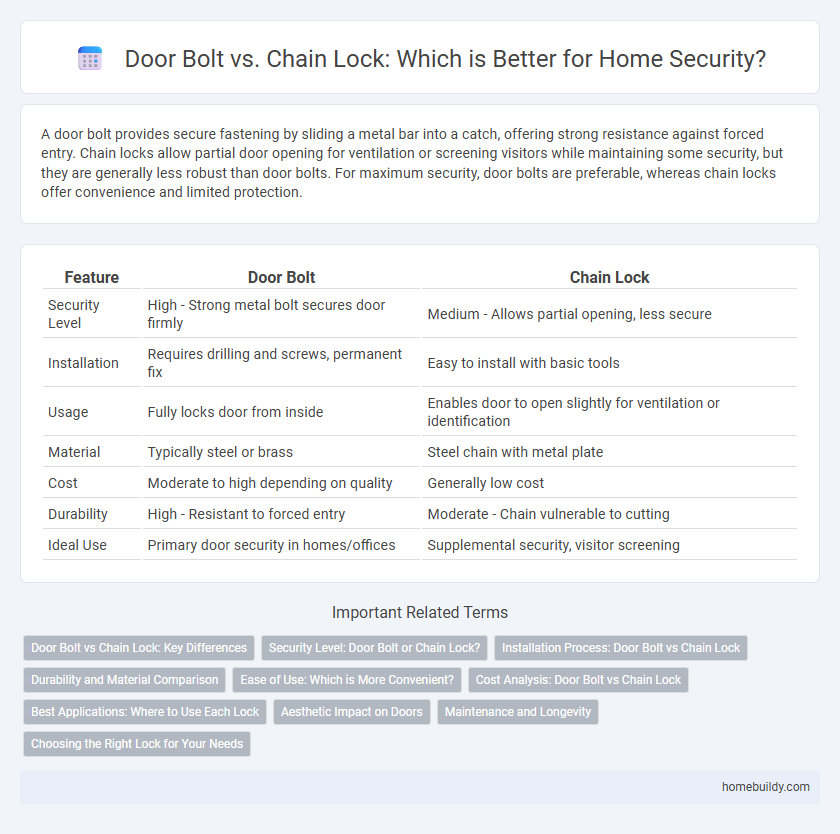A door bolt provides secure fastening by sliding a metal bar into a catch, offering strong resistance against forced entry. Chain locks allow partial door opening for ventilation or screening visitors while maintaining some security, but they are generally less robust than door bolts. For maximum security, door bolts are preferable, whereas chain locks offer convenience and limited protection.
Table of Comparison
| Feature | Door Bolt | Chain Lock |
|---|---|---|
| Security Level | High - Strong metal bolt secures door firmly | Medium - Allows partial opening, less secure |
| Installation | Requires drilling and screws, permanent fix | Easy to install with basic tools |
| Usage | Fully locks door from inside | Enables door to open slightly for ventilation or identification |
| Material | Typically steel or brass | Steel chain with metal plate |
| Cost | Moderate to high depending on quality | Generally low cost |
| Durability | High - Resistant to forced entry | Moderate - Chain vulnerable to cutting |
| Ideal Use | Primary door security in homes/offices | Supplemental security, visitor screening |
Door Bolt vs Chain Lock: Key Differences
A door bolt provides a solid metal bar that slides into a bracket or socket, ensuring a secure and rigid lock which is highly resistant to forced entry. In contrast, a chain lock consists of a metal chain attached to the door and frame, allowing partial opening for conversation or ventilation but offers less security against break-ins. Door bolts are preferred for maximum protection and durability, while chain locks prioritize convenience and controlled access.
Security Level: Door Bolt or Chain Lock?
Door bolts provide a higher security level than chain locks by offering a solid metal bar that firmly secures the door against forced entry. Unlike chain locks, which can be easily broken or manipulated, door bolts resist prying and kicking attacks due to their robust construction and direct locking mechanism. For enhanced home security, installing a door bolt is a more reliable choice compared to a chain lock.
Installation Process: Door Bolt vs Chain Lock
Door bolts require precise alignment with the door frame and typically involve drilling multiple holes for secure mounting, ensuring enhanced stability and security. Chain locks have a simpler installation process, often needing just two screws--one on the door and one on the frame--making them quicker to install but less robust. The complexity of door bolt installation generally results in stronger reinforcement compared to the easier and less secure setup of chain locks.
Durability and Material Comparison
Door bolts typically offer superior durability compared to chain locks due to their solid metal construction, often made from stainless steel or brass, which resists corrosion and physical force. Chain locks usually utilize thinner metal chains and weaker locking mechanisms, making them less effective against forced entry. The robust thickness and secure mounting hardware of door bolts ensure enhanced long-term reliability and strength over chain locks.
Ease of Use: Which is More Convenient?
Door bolts offer straightforward operation with a simple sliding mechanism that secures the door quickly, making them highly convenient for frequent use. Chain locks require the user to lift and hook the chain, which can be slightly more cumbersome, especially for individuals with limited dexterity. Overall, door bolts provide greater ease of use and faster locking than chain locks.
Cost Analysis: Door Bolt vs Chain Lock
A door bolt generally costs less upfront compared to a chain lock, with prices ranging from $10 to $30, whereas chain locks typically start around $15 and can go up to $50 depending on materials and security features. Installation expenses for door bolts are often lower due to simpler hardware and fewer time requirements, while chain locks may need professional fitting to ensure proper alignment and durability. Long-term maintenance favors door bolts as they tend to have fewer moving parts, reducing the likelihood of wear and replacement costs relative to chain locks.
Best Applications: Where to Use Each Lock
Door bolts are best suited for securing heavy, solid doors where maximum strength and resistance to forced entry are needed, such as exterior entry doors or gates. Chain locks provide a flexible security option ideal for interior doors, like bedroom or hotel doors, allowing partial opening for ventilation or communication while maintaining safety. Choosing between door bolts and chain locks depends on the required level of security and the door's function in residential or commercial settings.
Aesthetic Impact on Doors
Door bolts offer a sleek and minimalistic aesthetic that seamlessly integrates with various door designs, enhancing the overall appearance without drawing undue attention. Chain locks tend to appear bulkier and more utilitarian, potentially disrupting the door's visual harmony and making the entrance look less refined. Choosing a door bolt can preserve the door's clean lines and contribute to a more polished and modern look.
Maintenance and Longevity
Door bolts require minimal maintenance, often needing only occasional lubrication to ensure smooth operation, which enhances their longevity compared to chain locks. Chain locks have multiple moving parts and chains that can wear out or rust over time, demanding more frequent inspection and upkeep. The robust design of door bolts typically results in a longer lifespan, making them a more durable security option for repeated use.
Choosing the Right Lock for Your Needs
Door bolts provide robust security by firmly securing doors in place, making them ideal for high-traffic or external doors requiring strong resistance against forced entry. Chain locks offer convenience and partial door opening for visibility or communication but deliver less security compared to door bolts. Choosing the right lock depends on balancing security needs with ease of use, where door bolts excel in protection and chain locks in controlled access.
Door bolt vs chain lock Infographic

 homebuildy.com
homebuildy.com